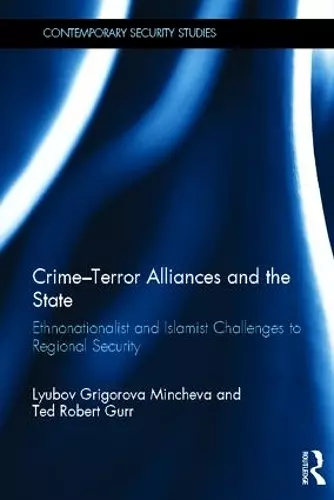Crime-Terror Alliances and the State
Ethnonationalist and Islamist Challenges to Regional Security
Ted Robert Gurr author Lyubov Mincheva author
Format:Hardback
Publisher:Taylor & Francis Ltd
Published:7th Dec '12
Currently unavailable, and unfortunately no date known when it will be back
This hardback is available in another edition too:
- Paperback£49.99(9780415657785)

This book examines the trans-border connections between militant and criminal networks and the relationship between these and the states in which they operate.
"Unholy alliances" is a term used to describe hybrid trans-border militant and criminal networks that pose serious threats to security in Europe and elsewhere. Identity networks provide the basis for militant organizations using violent strategies – insurgency and terrorism – for political objectives. To gain funds and weapons militant networks may establish criminal enterprises, or align with existing trans-border criminal and financial networks.
This book extends the concept of unholy alliances to include the trans-state criminal syndicates that arise in failed and dysfunctional states, exemplified by Serbia and Bulgaria during their post-Communist transitions. To deal with this complex and unconventional subject, the authors develop a theoretical framework that looks at four kinds of factors conditioning the interaction between the political and the criminal: trans-state identity networks, armed conflict, the balance of market opportunities and constraints, and the role of unstable and corrupt states. The volume also examines actors at two levels of analysis: the structure and activities of militant (and/or criminal) networks, and the policies of state actors that shape and reshape the interaction of opportunities and constraints.
This book will be of much interest to students of terrorism, insurgency, transnational crime, war and conflict studies, and IR in general.
"Both criminologist and political scientists have found it difficult to find adequate conceptual tools to address political crime and criminal politics. Here then, at long last, is a study that provides a sophisticated theoretical framework and new conceptual tools to understand the complex interaction between kleptocratic public officials, trans-border organized crime syndicates and identity-based international terrorist networks. It has been said that nothing is as practical as a good theory. In this sense, this path-breaking volume with its six in-depth case studies should be an eye-opener for national law enforcement agencies as well as Europol and Interpol." – Alex P. Schmid, Editor, Perspectives on Terrorism & Fellow, International Centre for Counter-Terrorism
"This pathbreaking book by Gurr and Mincheva addresses one of the issues that transcends traditional academic disciplines-- cross-border networks of criminals and terrorists. With rich case study material from the Balkans, the Middle East, and North Africa, the authors explore the intersection of organized crime and terrorism with stunning insight. The book is a must read for scholars of organized crime, terrorism, and money laundering, regardless of the disciplines with which they identify."-Peter Grabosky, Australian National University
"The academic disciplines of political science and criminology have long kept political and criminal issues in artificially isolated silos. Mincheva and Gurr break through these silos by examining the violent intersection of organized crime and terrorism. Using six carefully selected case studies they scrutinize the trans-border militant and criminal networks that currently pose a major security threat to many parts of the world. The result is an important look at how politics and crime sometimes bleed into each other."-Gary LaFree, University of Maryland, USA
"Moving beyond high-sticking and charging the mound, Kevin Young's Sport, Violence and Society challenges the existing theoretical framework of violence in sports, arguing for an interpretation of violence in sport that includes not only violent acts committed on the field, but acts of violence that are intimately tied to sport, such as damage to the environment resulting from sporting activities. The sheer number of questions and topics raised in the course of this reimagining of the field as well as the plethora of sources used will make Sports, Violence and Society an important source for scholars of violence interested in broadening the horizons of the study of violence."–Sam Bieler, Urban Institute USA
"This book is a "must read" for specialists in organized crime and terrorism. In addition, it should be of particular interest to those who study state crime. When criminal insurgents rise to power, they often remain close to their old comares, and retain some of their old habits. The book will especially interest European scholars, given the fact that each of the criminal/political networks under analysis operates on the periphery of Western Europe. The implication of European regional security are self evident."–Peter Grabosky, Australian National University
'This book is a "must read" for specialists in organized crime and terrorism. In addition, it should be of particular interest to those who study state crime' - Peter Grabosky, Australian National University
ISBN: 9780415506489
Dimensions: unknown
Weight: 630g
256 pages